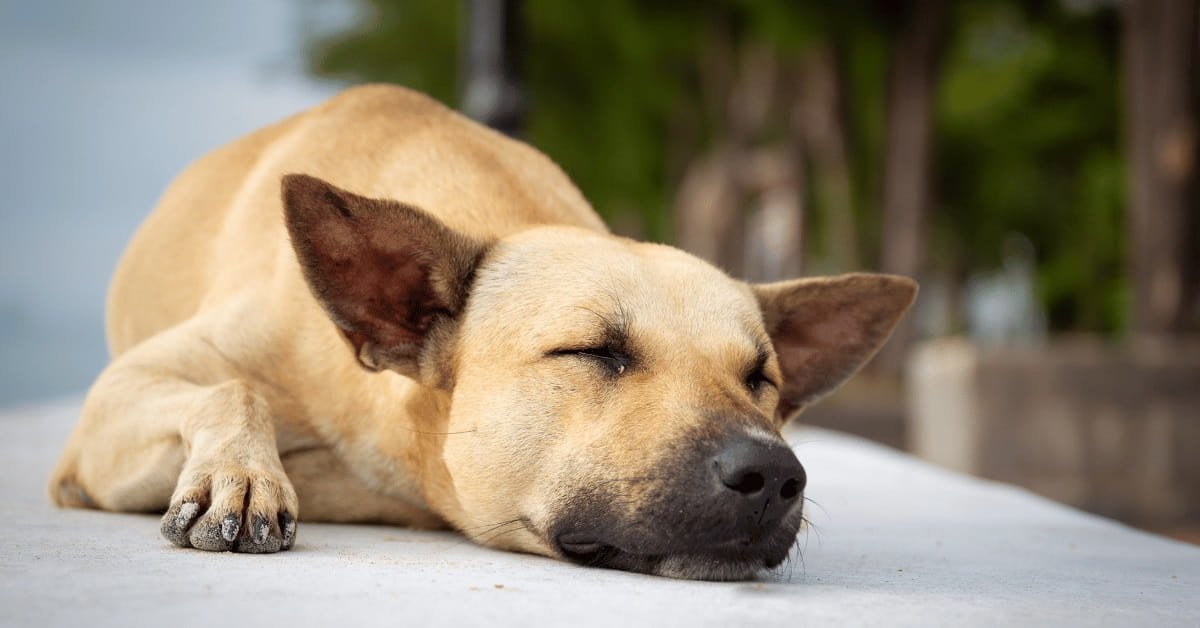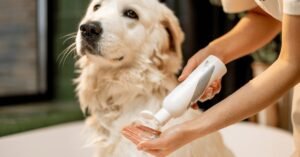Dogs typically experience pain for 24 to 72 hours after neutering. Pain management and proper care can reduce discomfort. Lets jump in deep: How Long are Dogs in Pain After Neutering?
Neutering is a common surgical procedure for dogs. It helps control the pet population and can prevent certain health issues. The surgery involves removing the testicles in males or the ovaries and uterus in females. After the procedure, dogs usually feel discomfort and pain for a few days.
Veterinarians often prescribe pain relief medications to help ease the pain. Proper post-operative care, including rest and limited activity, is crucial for a speedy recovery. Monitoring your dog for any unusual signs or complications is essential. Providing a calm and comfortable environment can significantly aid in their healing process.
Table of Contents
Neutering Procedure: How Long are Dogs in Pain After Neutering?
Neutering is a common surgery for dogs. It helps control the pet population. Many pet owners worry about their dogs’ pain after neutering. Understanding the process can help ease these worries.
What Happens During Surgery
Neutering involves removing a male dog’s testicles. The vet starts by giving the dog anesthesia. This makes the dog sleep and feel no pain. The vet then makes a small cut near the scrotum. They carefully remove the testicles through this cut. The cut is then stitched up. The entire surgery usually takes about 30 minutes.
Recovery Room Process
After surgery, the dog is moved to the recovery room. The vet team monitors the dog as it wakes up from anesthesia. They check for any signs of pain or discomfort. Most dogs are groggy and may feel a little pain. The vet gives pain medication to help.
- Monitor the dog closely
- Provide pain relief medication
- Ensure the dog is comfortable
The dog stays in the recovery room until fully awake. This usually takes a few hours. Once the dog is awake and stable, they can go home. The vet will give instructions for home care. Following these instructions helps speed up recovery.
Immediate Post-operative Pain
Neutering is a common procedure for dogs. It’s done to prevent unwanted litters and improve behavior. After surgery, dogs may experience immediate post-operative pain. Understanding this pain is vital for proper care.
Signs Of Discomfort
Dogs show discomfort in various ways. Look for these signs:
- Whining or whimpering: Vocalizing pain is common.
- Licking the incision site: Dogs may lick to soothe the area.
- Reduced activity: They might move less due to pain.
- Loss of appetite: Pain can reduce their desire to eat.
- Restlessness: Your dog might struggle to get comfortable.
Pain Relief Options
There are several options to manage your dog’s pain:
- Pain medication: Vets often prescribe painkillers. Follow their dosage instructions carefully.
- Cold compress: Apply a cold pack to reduce swelling and pain.
- Comfortable bedding: Provide a soft bed for your dog to rest.
- Restrict activity: Limit your dog’s movement to prevent stress on the incision.
- Monitor the incision: Check for signs of infection like redness or swelling.
Proper post-operative care can help your dog heal faster. Always consult your vet for the best advice.

Credit: https://www.zeelandveterinary.com
First 24 Hours
The first 24 hours after neutering are crucial for your dog’s recovery. During this period, your dog may experience discomfort and show signs of pain. Understanding these signs helps you provide the best care for your furry friend.
Behavioral Changes
After neutering, your dog might display various behavioral changes. These changes are usually temporary and part of the healing process. Here are some common changes you might notice:
- Lethargy: Your dog may seem more tired than usual.
- Whining: They might vocalize more due to discomfort.
- Appetite loss: It’s normal for their appetite to decrease.
- Restlessness: They may have trouble getting comfortable.
Monitoring Your Dog
It’s essential to monitor your dog closely after neutering. Keep an eye on their behavior and physical condition. Here are some tips to help you:
- Check the incision site: Look for redness, swelling, or discharge.
- Limit activity: Prevent your dog from jumping or running.
- Provide a quiet space: Ensure they have a calm area to rest.
- Offer soft food: Soft food may be easier for them to eat.
If you notice any severe pain or unusual symptoms, contact your vet immediately.
First Week Of Recovery
The first week after neutering is crucial for your dog’s recovery. It’s essential to monitor your dog’s progress and ensure they are comfortable. This period often involves some pain and discomfort, but with proper care, your dog can recover smoothly.
Activity Restrictions
During the first week, it’s important to limit your dog’s activity. Too much movement can cause complications like swelling or bleeding. Here are some tips for managing their activity:
- Keep your dog in a small, quiet area.
- Use a leash for bathroom breaks.
- Avoid letting them run, jump, or play.
- Consider using a crate for rest periods.
These restrictions help prevent stress on the surgical site and promote healing.
Signs Of Complications
Monitor your dog closely for any signs of complications. Early detection is key to preventing serious issues. Watch for the following symptoms:
- Excessive swelling or redness at the incision site.
- Pus or discharge from the incision.
- Foul odor coming from the wound.
- Lethargy or lack of appetite.
- Difficulty urinating or defecating.
If you notice any of these signs, contact your veterinarian immediately. Prompt attention can make a big difference in your dog’s recovery.
Long-term Recovery
Neutering is a routine procedure for dogs. The long-term recovery process is crucial for their overall health. Understanding the recovery stages helps pet owners provide better care. Let’s explore the expected healing time and when to contact a vet.
Expected Healing Time
Most dogs recover from neutering within two weeks. The first few days are the most critical. During this time, your dog might experience discomfort. Pain usually decreases within a week. By the end of two weeks, most dogs are back to their normal activities.
| Day | Recovery Stage |
|---|---|
| 1-3 | Initial pain and discomfort |
| 4-7 | Reduced pain, healing begins |
| 8-14 | Significant healing, return to normal activity |
When To Contact A Vet
Sometimes, complications can arise. You should contact a vet if you notice any of the following signs:
- Swelling or redness around the incision
- Excessive bleeding from the wound
- Unusual discharge or odor
- Dog seems lethargic or depressed
- Loss of appetite for more than a day
- Dog has trouble urinating
It’s important to monitor your dog’s behavior closely. Quick action ensures a smooth recovery.
Pain Management Tips
Neutering is a common procedure, but your dog may feel pain afterward. Managing this pain is crucial for their comfort and recovery. Below are some effective pain management tips to help your furry friend.
Medications
Pain medications prescribed by your vet can help. These medications reduce inflammation and discomfort. Follow the vet’s instructions carefully.
- NSAIDs: Non-steroidal anti-inflammatory drugs can relieve pain and swelling.
- Opioids: For severe pain, opioids may be given for short-term relief.
- Antibiotics: Prevent infections and promote healing with prescribed antibiotics.
Always monitor your dog for any side effects. If you notice anything unusual, contact your vet immediately.
Home Remedies
Besides medications, there are home remedies that can aid in pain management. These remedies can make your dog more comfortable.
- Cold Compress: Apply a cold compress to the surgical site to reduce swelling.
- Comfortable Rest Area: Create a quiet and comfortable space for your dog to rest.
- Soft Foods: Offer soft foods to make eating easier and less painful.
- Limit Activity: Keep your dog calm and limit physical activities to prevent strain.
Ensure your dog has easy access to water and their favorite toys. Comfort and care can significantly speed up recovery.
Emotional Well-being
Neutering is a common procedure for dogs, but it comes with emotional challenges. Understanding your dog’s emotional well-being is key to a smooth recovery.
Reducing Stress
Reducing stress is crucial for your dog’s recovery. A calm environment helps your dog heal faster. Here are some tips:
- Keep the house quiet and peaceful.
- Limit visitors and loud noises.
- Provide a comfortable, familiar space.
Routine is also important. Stick to regular feeding and walking times. Predictable routines can reduce anxiety and help your dog feel secure.
Comforting Your Dog
Comforting your dog after neutering is essential. Physical comfort and emotional support go hand-in-hand. Follow these steps:
- Spend quality time with your dog.
- Offer gentle petting and soothing words.
- Use a calm, soft voice to reassure them.
Consider using calming aids like pheromone sprays or calming treats. They can help ease anxiety and promote relaxation.
| Method | Benefit |
|---|---|
| Calming Music | Reduces anxiety |
| Comfortable Bedding | Provides physical comfort |
| Favorite Toys | Offers distraction |
Remember, your dog looks to you for comfort and reassurance. Show them love and patience during their recovery.
Frequently Asked Questions
How Long Do Dogs Feel Pain After Neutering?
Most dogs experience discomfort for 3-4 days after neutering. Pain usually subsides within a week. Always follow your vet’s advice.
What Can I Do To Comfort My Dog?
Provide a quiet, comfortable space for your dog. Limit their activity and follow any post-operative care instructions from your vet.
Are Pain Medications Necessary After Neutering?
Pain medications are often prescribed to manage discomfort. Always follow the vet’s instructions regarding dosage and duration.
How Can I Tell If My Dog Is In Pain?
Look for signs like whining, restlessness, or reluctance to move. Always consult your vet if you’re concerned.
Conclusion
Understanding your dog’s recovery after neutering can ease your worries. Most dogs feel pain for a few days. With proper care and attention, your furry friend will heal quickly. Always consult your vet for personalized advice. Remember, neutering has long-term health benefits for your dog.
Stay attentive and provide comfort during the healing process.



